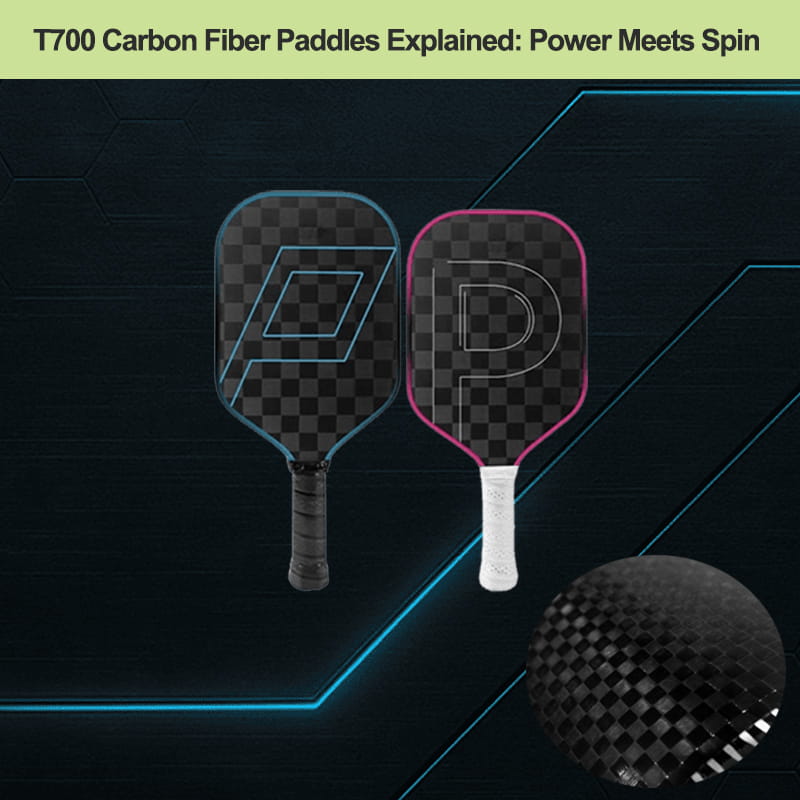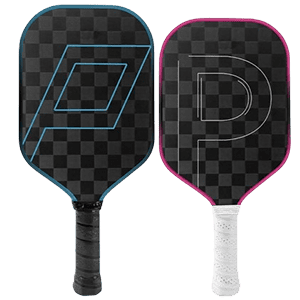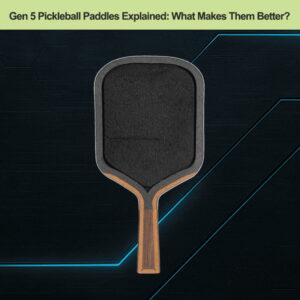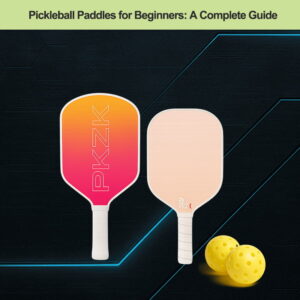
What Is a T700 Carbon Fiber Pickleball Paddle?
A T700 carbon fiber pickleball paddle refers to a paddle constructed using T700-grade carbon fiber fabric as the surface material. T700 is a high-strength carbon fiber known for its outstanding balance of stiffness, durability, and lightweight performance, making it a popular choice among players and paddle brands alike.
Unlike standard fiberglass or graphite surfaces, T700 carbon fiber offers a raw textured face that enhances spin control and ball grip. This raw finish allows players to generate more topspin and control their shots with greater precision — especially useful in dink battles, third-shot drops, and topspin drives.
From a materials standpoint, T700 carbon fiber has a tensile strength of approximately 4900 MPa, making it both strong and flexible. It delivers a crisp and responsive feel on impact while maintaining enough flex to reduce vibrations. This balance is one reason why T700 is widely used in thermoformed paddles, which are designed for serious players seeking both power and finesse.
At PKZK, we use T700 carbon fiber in both cold-pressed and thermoformed OEM paddles, offering custom solutions for brands looking to stand out in the competitive pickleball market. Whether you’re launching a new paddle line or upgrading your existing offerings, T700 carbon fiber provides a reliable and high-performance material choice.
In short, a T700 carbon fiber pickleball paddle combines advanced material science with player-centric design — delivering elite-level spin, durability, and control that appeals to competitive players and pro brands alike.
Why T700 Carbon Fiber Is the Preferred Material
T700 carbon fiber has become the go-to material for high-performance pickleball paddles — especially among advanced players and premium paddle brands. But what exactly makes it so desirable compared to other materials like fiberglass or lower-grade carbon?
High Strength & Lightweight Performance
T700 carbon fiber is classified as a high-strength standard modulus fiber, offering an ideal balance between stiffness and flexibility. With a tensile strength of around 4900 MPa, it can absorb powerful impacts without cracking or warping. At the same time, its lightweight nature helps players swing faster with less fatigue — perfect for quick volleys, reaction shots, and extended rallies.
This makes T700 paddles lighter than fiberglass paddles but stronger than standard graphite-faced options.
Durable Yet Flexible
T700 isn’t just strong — it’s also remarkably resilient under repeated stress. The material is flexible enough to absorb energy and reduce wear over time, making it less prone to delamination or surface cracking. Paddles built with T700 carbon fiber tend to last longer, even under high-intensity play.
For paddle brands, this means fewer returns and higher customer satisfaction. For players, it means a consistent paddle feel from game to game.
Raw Surface Texture for Better Spin
One of the most important benefits of T700 carbon fiber in pickleball paddle design is its raw, woven texture. Unlike painted or smooth surfaces, raw T700 creates natural surface friction, which grips the ball upon contact. This results in noticeably better spin generation, whether you’re hitting topspin drives, slicing third shots, or applying side spin on dinks.
Most pro-level paddles today use raw carbon fiber surfaces — and T700 offers the ideal texture for maximum control without sacrificing power.
In summary, T700 carbon fiber delivers a rare combination of strength, durability, lightness, and spin-enhancing texture — making it a top material choice for pickleball paddles aimed at serious players.
T700 vs. T800 — Which Carbon Fiber Is Better for Paddles?

When it comes to premium pickleball paddles, T700 and T800 carbon fiber are two of the most commonly discussed materials. While both belong to the same high-performance carbon fiber family, they serve slightly different purposes — and choosing the right one depends on your performance goals.
Key Differences in Composition & Feel
Both T700 and T800 are classified as standard modulus carbon fibers, but T800 has a higher tensile strength and stiffness compared to T700. This makes T800 slightly more rigid and efficient at transferring energy during impact.
| Property | T700 Carbon Fiber | T800 Carbon Fiber |
| Tensile Strength (MPa) | ~4900 | ~5400 |
| Modulus | Standard | Higher (stiffer) |
| Flexibility | More flexible | More rigid |
| Touch/Feel | Softer & more forgiving | Crisper & more direct |
| Price (Raw Material) | More cost-effective | More expensive |
While T800 can provide more pop and energy return, it often sacrifices a bit of touch and dwell time, making it less forgiving on soft shots like dinks and drops. T700, on the other hand, maintains a better balance between control, spin, and comfort — which is why it remains the most widely used carbon fiber in both OEM and pro-level paddle lines.
Why T700 Is More Popular for Pickleball
In the world of pickleball, control and versatility often outweigh sheer power. T700 carbon fiber offers:
- Softer touch for better ball feel
- Enhanced control on soft shots
- Superior spin due to raw surface texture
- Lower raw material cost — better for brands managing paddle margins
For most intermediate and advanced players, the difference in power between T700 and T800 is marginal. But the improvement in feel, spin, and control with T700 can significantly impact gameplay — especially in longer rallies and net play.
That’s why even many “pro-level” paddles on the market still favor T700 carbon fiber — it delivers consistent performance across all shot types.
Toray T700 vs. China Brand T700 — What’s the Difference?
T700 carbon fiber is originally developed by Toray Industries, a world-leading Japanese carbon fiber manufacturer. However, in today’s pickleball paddle market, many OEM factories — including PKZK — use China-produced T700 carbon fiber. Why? Let’s break down the differences and explain why China-made T700 is widely adopted across the industry.
Quality Comparison: Toray T700 vs. China Brand T700
Both Toray T700 and high-quality Chinese T700 are made to similar mechanical specifications:
- Tensile Strength: ~4900 MPa
- Modulus of Elasticity: ~230 GPa
- Density: ~1.8 g/cm³
However, there are a few differences:
| Factor | Toray T700 | China Brand T700 |
| Origin | Japan | Mainland China |
| Brand Reputation | Globally recognized, aerospace-grade | Widely used in sporting goods |
| Consistency | Extremely consistent fiber tow | Slightly more variability batch-to-batch |
| Price | Significantly higher | Much more cost-effective |
| Lead Time | Longer (imported material) | Shorter (domestic sourcing) |
Toray offers top-tier fiber quality, but the cost per paddle increases significantly — often by $5–10+ depending on the surface area and thickness. For paddle brands focused on competitive retail pricing or scalable production, China-made T700 provides similar performance at a fraction of the cost.
Why Most Paddle Brands Choose China-Made T700
Over 90% of carbon fiber pickleball paddles on the market today use Chinese-produced T700, and for good reason:
- ✅ Cost Efficiency: Helps keep paddles under critical price points (e.g., $129, $149 MSRP)
- ✅ Stable Supply Chain: Easier to manage raw material stock and avoid international shipping delays
- ✅ Performance Proven: Thousands of paddles tested and approved in the market with China T700
- ✅ OEM-Friendly: Works seamlessly in both cold-pressed and thermoformed production methods
At PKZK, we work with reliable China-based carbon fiber suppliers who produce T700 fabric with stable quality, consistent weave, and excellent bonding strength. For customers needing premium branding or pro-level endorsement paddles, we can also source Toray T700 on request, but in most cases, China T700 offers the best value-to-performance ratio for B2B paddle projects.
Whether you’re launching a new brand or scaling your existing paddle line, using China-made T700 allows you to optimize costs without sacrificing performance.
Performance Benefits of T700 Carbon Fiber Pickleball Paddles

T700 carbon fiber isn’t just a buzzword — it’s a high-performance material that delivers real advantages on the court. Whether you’re a competitive player or a brand developing your next paddle line, understanding how T700 impacts spin, power, and control can help you make a smarter decision.
Spin and Control: Raw Surface Texture That Grips the Ball
One of the key benefits of T700 carbon fiber is its natural woven texture. Unlike painted or smooth paddle surfaces, raw carbon fiber provides enhanced surface friction, allowing the paddle to grip the ball on contact. This leads to:
- Greater spin potential on topspin drives and slices
- Improved control on dinks, resets, and drop shots
- Better precision during net exchanges and placement shots
This is why most high-end spin-oriented paddles now feature raw T700 surfaces — it enhances playability across all levels.
Power and Pop: Efficient Energy Transfer
T700 carbon fiber has a high tensile strength and stiffness, which enables it to efficiently transfer energy from your swing into the ball. Compared to fiberglass, which flexes more and absorbs impact, T700 produces a more powerful response. This translates to:
- Faster ball speed during volleys, drives, and overheads
- More consistent performance across the sweet spot
- A crisp, responsive feel at contact
Thermoformed paddle structures, especially with edge foam support, further enhance this energy transfer for players who value power without sacrificing control.
Comfort and Playability: Lightweight Feel, Reduced Vibration
Despite its strength, T700 carbon fiber is incredibly light. When paired with a polymer honeycomb or foam-filled core, it allows paddle designers to create paddles that are powerful yet easy to maneuver. Additional benefits include:
- Reduced player fatigue during long games
- Improved shock absorption on off-center hits
- A softer, more forgiving touch for sensitive wrists or elbows
For many players, T700 paddles strike the right balance between stability and comfort, especially in demanding or extended match play.
In summary, paddles made with T700 carbon fiber offer a winning combination of spin, power, and comfort — all of which are essential for both casual competitors and serious athletes.
Who Should Choose a T700 Carbon Fiber Paddle?
Not every paddle suits every player — and T700 carbon fiber paddles are best matched to those who want a blend of power, control, and responsiveness. Whether you’re a serious competitor or a brand developing paddles for discerning players, understanding the ideal user profile is essential.
Intermediate to Advanced Players
T700 carbon fiber paddles are designed for players who have moved beyond the beginner stage and are now focused on refining technique, consistency, and strategy. These paddles offer:
- More precise ball control
- Increased spin potential
- A stiffer face that rewards proper technique
For players who want to level up their game, especially in tournaments or competitive leagues, T700 paddles provide the responsiveness needed to execute advanced shot types.
Players Seeking More Spin and Touch
The raw carbon surface of a T700 paddle allows for excellent grip on the ball. Players who rely on spin — whether for topspin drives, slice returns, or spinning dinks — will appreciate how much control the paddle provides during fast exchanges and soft net play.
Competitive Athletes Focused on Performance
T700 paddles are especially suited for those who demand consistency, power, and feel in every shot. The combination of a stiff carbon face and lightweight construction allows for quicker hand speed at the net while still delivering solid drives and blocks. These are critical features for 4.0+ level players or those entering competitive tournament circuits.
Paddle Brands Targeting the High-End Market
From a manufacturing and branding standpoint, T700 carbon fiber is one of the most sought-after materials in today’s premium paddle segment. If you’re building a product line that targets serious players — whether via cold-pressed or thermoformed construction — using T700 will help position your brand as performance-driven and technically advanced.
Many top-selling paddles on the market today feature T700 because it delivers on both playability and marketing appeal.
In short, T700 carbon fiber paddles are ideal for players and brands looking for professional-level performance — especially in areas like spin control, quick response, and lightweight handling.
Conclusion — Is T700 Carbon Fiber Right for You?
T700 carbon fiber has earned its reputation as one of the best-performing materials in modern pickleball paddle design. From enhanced spin to responsive power and long-term durability, it delivers the balance that serious players and high-end paddle brands are looking for.
For players, a T700 carbon fiber paddle offers:
- Superior spin and control thanks to its raw textured face
- Lightweight handling and reduced fatigue during extended play
- Powerful response with crisp feedback for competitive performance
For paddle brands and distributors, it provides:
- High market demand across all playing levels
- Flexible manufacturing options (cold-pressed or thermoformed)
- Proven material stability and scalability for large production runs
At PKZK, we specialize in custom OEM and ODM manufacturing of carbon fiber pickleball paddles — helping you launch or expand your product line with confidence. Whether you need a few hundred cold-pressed paddles or a full-scale thermoformed line with molded edges and foam core, we can deliver the quality, consistency, and customization your brand needs.
Ready to bring your T700 carbon fiber paddle to market?
At PKZK, we help paddle brands worldwide turn ideas into high-performance products. If you’re looking for custom pickleball paddles in bulk, we offer full OEM/ODM support — from surface materials like T700 carbon fiber to mold design, packaging, and global shipping.
Contact us today to request samples or discuss your project needs.




1 comment